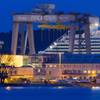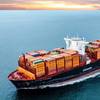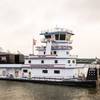The chief executive of Swedish ferry operator Stena Line AB shrugged off fears of losing sea travelers as fares rise and more bridges and tunnels are built, saying that he was still optimistic about the future.
With the loss of duty-free sales in Europe since July 1, Stena has already seen a drop in on-board retailing and slashed 660 jobs. To add to its woes, a bridge connecting Sweden and Denmark is being built, reducing a potential market for Stena.
"We've taken a lot of the pain already to adjust to the abolition of duty-free," said Stena CEO Bo Severed. "I'm not satisfied with the results level, and we need to improve on that. ... But the basis of the business is sound."
Stena Line posted a pre-tax loss of $27.9 million for the first six months of 1999 versus a loss of $63.5 million in the 1998 period.
Stena Line, which raised some fares to combat income loss, is bracing for the disappearance of the "booze cruise," which provides income from purely leisure travelers who pay a small fare for onboard bars, restaurants, tax-free shopping and entertainment.
Stena could provide the cheap fare because of duty-free sales, which were abolished within the EU this summer, despite fierce lobbying by ports, airports, airlines, tobacco and drink companies.
Stena Line maintains that its passengers will still find bargains when traveling between countries with big tax differentials, such as Sweden and Germany, the Netherlands and Britain, and Britain and France.
Swedes can still pick up a one-liter standard bottle of whisky between Sweden and Germany for $21.63 against $38.45 onshore at home, Severed said.
The difference is that Stena no longer gets such high margins from the sales because it must now pay a German tax. Previously, it did not have to pay any tax at all.
Stena Line officials also believe there is growth in the market for travelers who are vacationing for longer periods, not just for the onboard attractions, adding that freight is also an area where growth is possible.
"Cargo and freight will be important in the future and in relative terms, more important than today," Severed said.
Volumes of travelers with cars - less likely to be part of "booze cruise" passengers - were steady, which Severed said was encouraging and represented an important group in the future.
In the last few years Stena Line has stepped up investments as part of preparations for the loss of duty-free revenue, which accounted for about 24 percent of turnover in 1998.
These include technology improvements such as high-speed ferries which skim across the water's surface at twice the speed of conventional ferries and investments in Irish Sea and Scandinavian ports, Severed said. "We are seeing that more and more of our customers are choosing to go on high-speed ferries," he added.
Meanwhile, In preparation for the loss of revenue from duty-free sales and following the opening of the Eurotunnel connecting Britain and France - a key Stena Line route - Stena merged English Channel operations with those of Peninsular & Oriental Steam Navigation Co. "We're very pleased with the development there," said Severed about the joint venture, P&O Stena Line, which started operating in March.
Sponsored Content
Lower carbon intensity fuels to support your operations

Subscribe for
Maritime Reporter E-News
Maritime Reporter E-News is the maritime industry's largest circulation and most authoritative ENews Service, delivered to your Email five times per week










